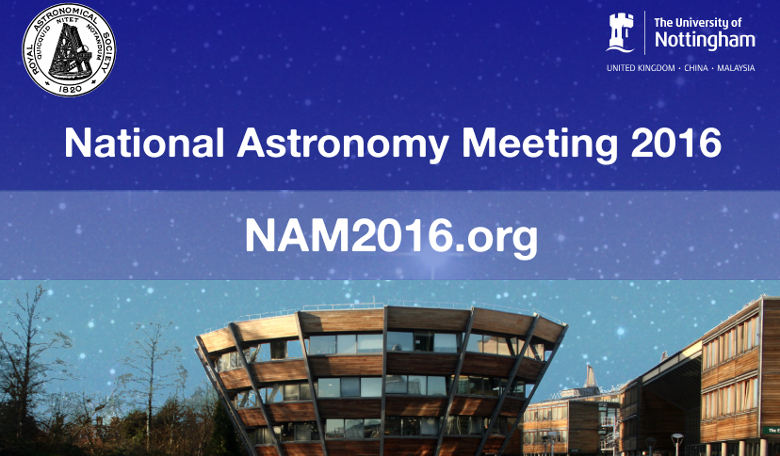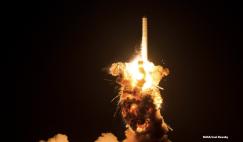Last week marked the annual UK National Astronomy Meeting (NAM), held each year at a different academic institution. This year, it was the turn of the University of Nottingham to host the conference and ROOM, The Space Journal was there to learn all about the latest astronomical research from diverse topics such as solar physics, cosmology, galaxy evolution, transient objects, exoplanets and archaeoastronomy, to name but a few.
A number of invited plenary speakers – who are all experts in their fields – gave fascinating talks on subjects such as The European Extremely Large Telescope (E-ELT), the Herschel view of galaxies throughout cosmic time and the JUICE mission to Jupiter and its moons, with each speaker somehow managing to condense the lifetime of a particular mission or the history of a subject into one awe-inspiring hour.
The sponsors of the conference, the Royal Astronomical Society, also organised a community forum session whereby organisations such as the UK Space Agency (UKSA) and the Science and Technology Facilities Council (STFC) discussed pressing matters such as the future of funding for astronomical research projects, following the recent UK referendum result. For the UKSA it was not all doom and gloom. Dr Katherine Wright, Head of Space Science lightened moods by stating that their membership of the European Space Agency (ESA), was not dependant on the UK’s membership of the EU, therefore projects currently in development, such as Athena, Euclid and Solar Orbiter would still benefit from their involvement.
However, Dr Wright did point out that the UKSA was responsible for funding scientists (based in the UK) working on mission-specific instrumentation and does not fund the actual research done using the instruments themselves. This falls to the STFC and it was clear from STFC’s CEO, Professor John Womersley, that along with being dealt another ‘flat cash’ financial settlement for the next four years by the UK government, coupled with the UK’s impending departure from the EU, funding issues are a real source of concern and much will need to be addressed before the official withdrawal process begins.
Professor Womersley also added that although there continues to be a lot of good news, some of the big contracts that have been put in place for the European-Extremely Large Telescope (E-ELT) have not yielded the results hoped for UK companies involved in the project. Nonetheless, this would not detract from the science that will eventually be done with the telescope and STFC were looking at other instrument development projects to contribute to, on top of the two already planned for integration with the telescope (HARMONI and METIS).
The UK community continues to be hugely successful in winning ESO time on various projects compared with the financial share it puts in and with renewed support for the ALMA regional centre, LOFAR and the Wide Field Units, along with the construction of MOONS (Multi-Object Optical and Near-infrared Spectrograph) and contributions to DKIST (The Daniel K. Inouye Solar Telescope), DESI (The Dark Energy Spectroscopic Instrument) and LSST (Large Synoptic Survey Telescope) all progressing to schedule, the future seems positively bright.
Nevertheless, it was hard to escape that the overall feeling was one of uncertainty, with a hint of exasperation at the recent ‘Brexit’ vote, as the UK astronomical community relies heavily on EU backing to fund its many researchers and associated projects. Still, it was seen by those at the top that the show must go on, and that the UK must continue to be at the forefront of research as it always strives to be.











